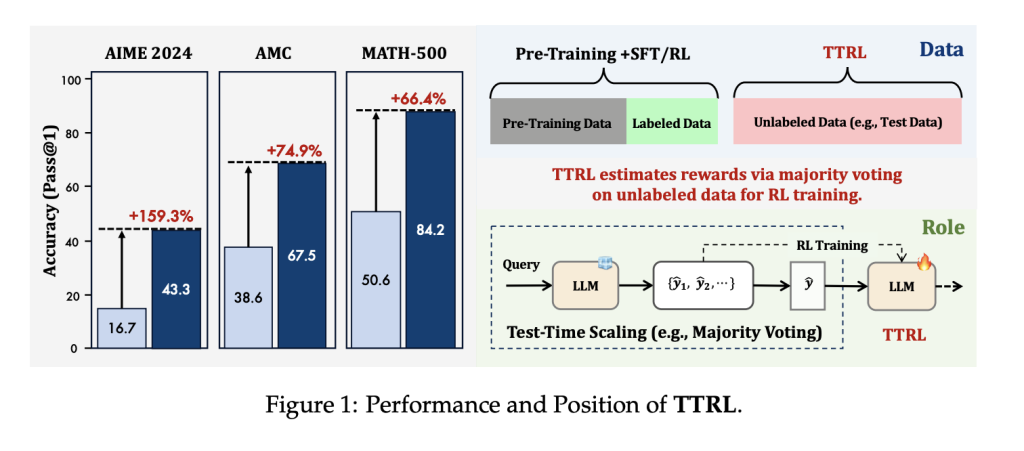Despite significant advances in reasoning capabilities through reinforcement learning (RL), most large language models (LLMs) remain fundamentally dependent on supervised data pipelines. RL frameworks such as RLHF have pushed model alignment and instruction-following performance but rely heavily on human feedback and labeled datasets. As LLMs are increasingly applied in dynamic environments—ranging from educational settings to scientific workflows—they are required to generalize beyond curated training data.
However, existing models often exhibit performance gaps when confronted with distribution shifts or novel reasoning tasks. While techniques like Test-Time Scaling (TTS) and Test-Time Training (TTT) have been proposed to mitigate this, the absence of reliable reward signals during inference poses a core challenge for deploying RL in unsupervised settings.
Test-Time Reinforcement Learning (TTRL): Leveraging Model Priors for Self-Adaptation
Researchers from Tsinghua University and Shanghai AI Lab introduced Test-Time Reinforcement Learning (TTRL). TTRL is a training framework that applies RL during inference, using only unlabeled test data. It leverages the intrinsic priors of pre-trained language models to estimate pseudo-rewards through majority voting across sampled outputs.
Instead of relying on explicit labels, TTRL constructs reward functions by aggregating multiple model-generated responses to a given query. A consensus answer, obtained via majority voting, is treated as a pseudo-label. Model responses that align with this pseudo-label are positively reinforced. This formulation transforms test-time inference into an adaptive, self-supervised learning process, allowing LLMs to improve over time without additional supervision.

TTRL has a two-stage approach:
- Label Estimation via Majority Voting: For each prompt, the model samples multiple outputs. The most frequent prediction is treated as the estimated label.
- Reward Assignment and Policy Optimization: A binary reward is assigned based on whether each sampled response matches the estimated label. The model is updated using gradient-based RL algorithms (e.g., PPO or GRPO) to maximize agreement with the pseudo-labels.
This approach is notable for its simplicity and compatibility with standard RL methods. The reward function, though approximate, provides sufficient learning signal when aggregated over multiple samples. Experimental setups used temperature-controlled sampling (typically temperature = 1.0), with 64 samples for voting and 16 subsampled responses for training updates. No ground-truth labels are involved at any stage.

Empirical Findings across Mathematical Reasoning Tasks
TTRL was evaluated on three mathematical benchmarks: AIME 2024, AMC, and MATH-500. The results are consistent across both smaller and larger models:
- For Qwen2.5-Math-7B, performance on AIME 2024 increased from 16.7% to 43.3% (pass@1), an improvement of 159.3% without any labeled data.
- On average, across the three benchmarks, the same model achieved a relative gain of 84.1%.
- Notably, even a smaller model, Qwen2.5-Math-1.5B, improved from 33.0% to 80.0% on MATH-500.
These gains demonstrate that TTRL supports model improvement even in the absence of supervised training signals. Moreover, TTRL often outperforms the upper bound implied by its own training signal—i.e., the accuracy of the majority-voted predictions. This suggests a self-reinforcing learning loop that can extract richer supervision from noisy consensus signals.
Additional analyses showed that TTRL generalizes beyond the dataset it was applied to. When trained on one benchmark and evaluated on others, performance improvements persisted. This cross-task transfer indicates that TTRL does not lead to narrow overfitting but supports broader generalization.

Conclusion: Toward Self-Adaptive and Label-Free Learning
TTRL represents a novel shift in how reinforcement learning can be applied to LLMs in real-world settings. By reusing the model’s own generations as a proxy for supervision, it removes the need for expensive human annotations while enabling continual adaptation. The approach scales naturally with model size, is compatible with different RL algorithms, and shows promising robustness across tasks of varying difficulty.
While this study focuses on mathematical reasoning, the underlying ideas—self-estimated supervision, test-time adaptation, and reinforcement learning without labels—may generalize to other domains. As language models increasingly encounter tasks beyond their pre-training distribution, frameworks like TTRL offer a scalable path forward.
Further exploration is needed to understand the theoretical convergence properties of TTRL and to evaluate its applicability in interactive or multi-agent scenarios. Nonetheless, TTRL provides a technically sound and computationally efficient foundation for enabling LLMs to evolve continuously from their own outputs.
Check out the Paper and GitHub Page. Also, don’t forget to follow us on Twitter and join our Telegram Channel and LinkedIn Group. Don’t Forget to join our 90k+ ML SubReddit.
The post LLMs Can Now Learn without Labels: Researchers from Tsinghua University and Shanghai AI Lab Introduce Test-Time Reinforcement Learning (TTRL) to Enable Self-Evolving Language Models Using Unlabeled Data appeared first on MarkTechPost.
Source: Read MoreÂ

 [Register Now] miniCON Virtual Conference on AGENTIC AI: FREE REGISTRATION + Certificate of Attendance + 4 Hour Short Event (May 21, 9 am- 1 pm PST) + Hands on Workshop
[Register Now] miniCON Virtual Conference on AGENTIC AI: FREE REGISTRATION + Certificate of Attendance + 4 Hour Short Event (May 21, 9 am- 1 pm PST) + Hands on Workshop
